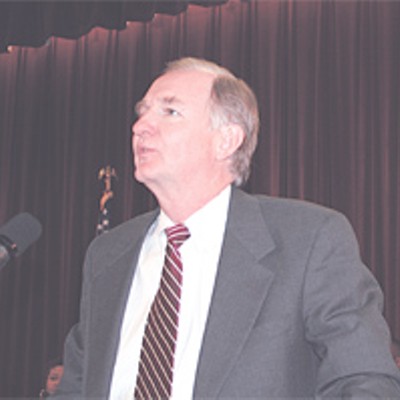Frustrated with the slow process of gradually chipping away at abortion rights through a series of restrictions to abortion, pro-life lawmakers in Georgia recently took a bolder move.
In March they introduced the first bill in the country to amend a state constitution to define embryos and fetuses from the moment of conception as persons entitled to a right to life.
The legislation is the latest sign of a widening strategic divide within the pro-life movement.
In recent years, those who have pushed an incremental approach to gradually restrict access to the procedure -- but not ban it altogether -- have enjoyed the upper hand. But the “personhood amendment” signals that absolutists are readying a more direct challenge to the incrementalists in their midst.
“For too long the pro-life movement has been dominated by a strategy of ‘wait;’ too fearful of losing to risk winning,” Richard Thompson, president of the Thomas More Law Center, a Christian legal advocacy group in Ann Arbor, Mich., said in a statement. “The adoption of this amendment will place Georgia at the forefront of the battle to restore the sanctity of innocent human life.”
To be sure, gaining the support of two-thirds of the lawmakers in both chambers of the Georgia Legislature and a majority of the state’s voters that is required to pass the “personhood amendment” will be an uphill battle.
Even if it were to become law, the amendment would not have any immediate effect on abortion rights in the state because it does not address criminal penalties, said Josh Brahm, a spokesperson for Georgia Right to Life in Lawrenceville, Ga.
And any legislation that did include criminal penalties would be blocked because the U.S. Supreme Court -- while restricting some access in its April decision banning a specific type of abortion procedure--has continued to uphold the basic right to abortion.
Still, Kay Scott, president of Planned Parenthood of Georgia in Atlanta, says the effort to endow embryos and fetuses with legal rights--the so-called personhood push--should not be discounted in her state.
If it passes, Georgia’s “personhood amendment” could provide anti-choice advocates legal language that could ultimately make abortion at any gestational age tantamount to murder and could eventually lead to the outlawing of everything from contraception to stem cell research to certain kinds of fertility treatments, Scott said.
“The rest of the country took a moderate turn at the last election, but Georgia sort of went to the right,” she said. “It’s clear they feel like it’s possible they could pass something like this in Georgia.”
If such an amendment were to pass in Georgia or anywhere else it could be used as a vehicle to mount a frontal legal challenge to Roe v. Wade, the 1973 Supreme Court ruling that legalized abortion, Brahm said.
Proponents of the amendment base their legal claim on a passage in the majority opinion of Roe v. Wade in which Justice Harry Blackmun said the court was not in a position to answer the question of when life begins but added that if the “personhood” of embryos and fetuses were ever established, the case for abortion would collapse under the equal protection clause of the Fourteenth Amendment.
In this view, the entire debate over abortion rights hinges on the question of personhood; if embryos and fetuses are granted that status, it would establish the legal underpinnings needed by anti-choice groups to overturn Roe v. Wade.
The Georgia amendment is the most conspicuous sign yet of the effort to recognize embryos and fetuses as persons, but the movement has seen significant under-the-radar success in recent years.
In 2002, the Bush administration issued a regulatory change to expand the State Children’s Health Insurance Program to include embryos and fetuses, making them separate beneficiaries of a government program, according to NARAL Pro-Choice America, an abortion rights advocacy group in Washington, D.C.
In 2004, President Bush signed a bill passed by the then Republican-controlled Congress that for the first time in federal law recognized embryos and fetuses as persons with rights apart from the mothers. Called the “Unborn Victims of Violence Act,” the law made it a separate federal crime to harm an embryo or fetus.
The bill gained traction after the highly publicized death of Laci Peterson, a California woman who was eight months pregnant when she was murdered by her husband in 2002.
This spring, the movement got a tacit boost from the April Supreme Court ruling that upheld a federal law banning an abortion procedure known as “intact dilation and evacuation.”
The decision itself did not break new ground on the question of personhood.
But writing for a 5-4 majority, Justice Anthony Kennedy said: “The state has an interest in ensuring so grave a choice is well informed.”
Some pro-life activists saw this as encouragement to pursue “informed consent” laws; some of these add counseling requirements to abortion services that are designed to elevate the emotional, if not legal, status of embryos and fetuses, said Scott of Planned Parenthood of Georgia.
One such restriction that is quickly gaining ground is a law requiring physicians to give pregnant women the opportunity to view an image of the fetus in an ultrasound screening before performing an abortion.
“Ultrasound requirements ensure informed choice because they allow a woman to see her unborn child as he or she really is, both by seeing his or her form and face on a screen and also by hearing the heartbeat,” Denise Burke, vice president and legal director for Americans United for Life, wrote in a 2006 legislative guide on state ultrasound bills.
The image, Burke wrote, helps establish a bond between the woman and her “unborn child,” making it more likely her plans to have an abortion will be dampened.
So far 10 states--Alabama, Georgia, Mississippi, Arkansas, Idaho, Michigan, Wisconsin, Indiana, Oklahoma and Utah --have passed an ultrasound law requiring physicians to give women the opportunity to view ultrasounds, according to National Right to Life, an anti-choice advocacy group in Washington, D.C. Louisiana, meanwhile, has mandated that physicians perform ultrasounds after 20 weeks gestation and offer women the opportunity to view the image.
State lawmakers will take more action on ultrasound bills on the heels of the Supreme Court’s abortion ruling, Heather Boonstra, a public policy associate at the New York-based Guttmacher Institute, predicted in a recent policy memo.
The “personhood” movement may also gain traction from a grassroots movement to grant birth certificates to stillborn fetuses, pro-choice advocates fear.
Over the last six years, 19 states have passed laws giving men and women the opportunity to request such certificates, and seven more states are considering similar legislation, known as “missing angels” bills.
Pro-choice advocates worry the laws could aid the anti-choice movement by elevating the status of the fetus. “There’s no question in my mind that the anti-abortion crowd will look for some way to use this,” said Kim Gandy, president of the National Organization for Women in Washington, D.C.
But Joanne Cacciatore, who delivered a stillborn fetus 13 years ago and subsequently began lobbying state legislatures to pass “missing angels” bills, brushed aside those fears.
“This is a bipartisan issue,” she said. “It has nothing to do with abortion.” 
To comment e-mail us at
House Resolution 536 would define life as beginning at the moment of fertilization, which not only could preclude abortion, but some birth control. Sponsors intend to seek approval next year of this ballot question:
“A RESOLUTION proposing an amendment to the Constitution so as to provide that the paramount right to life is vested in each human being from the moment of fertilization without regard to age, race, sex, health, function, or condition of dependency; to provide for submission of this amendment for ratification or rejection; and for other purposes.”




























